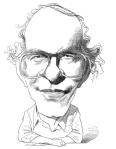 In an age dominated by greed and the pursuit of narrow self-interest, Peter Singer asks the question, “How are we to live?” Ultimately, we ought to live ethically, but what does that mean? To answer these questions, Singer draws on ancient to modern philosophy and explores the possibility of living an ethical life. Through the use of
In an age dominated by greed and the pursuit of narrow self-interest, Peter Singer asks the question, “How are we to live?” Ultimately, we ought to live ethically, but what does that mean? To answer these questions, Singer draws on ancient to modern philosophy and explores the possibility of living an ethical life. Through the use of
numerous case studies he examines the current dynamics in Western Civilization in order to derive general tendencies of the populations that inhabit them. Singer avers that it is an urgent matter to heed the call to live an ethical life, help end suffering in the world, and usher in a better tomorrow.
Singer’s discussion of whether an ethical life is possible is convincing and is the strongest aspect of the book. It allows him to lead to the discussion on what course of action is necessary to live such a life. He uses numerous examples drawing from the fields of history, philosophy, and evolutionary biology for a well rounded approach to these questions. I found particularly illuminating his discussion of how a stronger wolf will not kill a weaker one after it concedes defeat in battle. Singer quite correctly asks why this is so and speculates that there is a higher purpose being served, such as survival of the species. Moreover, his generic example of the nuclear family is another he uses to tackle the question of whether human beings are capable of living ethically. He shows that the selflessness exhibited by parents toward their children points toward an affirmation of his thesis.
The use of the Japanese business model as a counterexample to the American one serves to show a stark difference in the way human beings organize themselves in collective bodies. This is the weakest part of Singer’s argument. He conveys the impression that the Japanese have found the answer to how businesses should operate. In fairness, I partially agree with this premise. The distribution of pay and the treatment of workers like family members is something the American business model could use. Although Singer does raise the possibility that the Japanese system has flaws, especially discussing the long work hours coupled with the stress that comes with it, he stops short of questioning whether this way of life could conflict with his suggestion that we lead an ethical one. After all, if one works from 8 AM until 10 PM there is very little time left to live up to the noble callings of developing the welfare of all people. Moreover, one must question the underlying premise of the economic system, namely Capitalism, that Japan upholds and see whether it is contributing to, rather than alleviating, one of Singer’s central concerns: the rapacious destruction of the environment. Nonetheless, his use of the Japanese system sheds light on the possibility of human beings organizing themselves around the values of solidarity and concern for others.
Another weakness of the book is that the author fails to address other possible modes of living. I found myself asking, is life really a choice between some vague conception of an ethical life or a pursuit of wealth and power? Singer’s arguments would be much stronger if they addressed that which seems to be an obvious fact of life. Most people not only do not think of their lives in such a constricted manner but live a life consumed by the constant struggle to fulfill basic needs. It is this reality which prevents people from even pursuing the kinds of questions Singer is raising. For example, even in the economically developed countries, affordable housing and access to health care has become a growing problem to the point where the leading cause of bankruptcy is an inability to pay medical bills. This also leads one to believe that Singer’s audience is not the ordinary factory or office worker but those of the professional class. To add to this impression, his case studies of humans seem hyper-focused on the super rich and the very poor. Conspicuously absent from Singer’s account of Western society are the middle and working classes.
How Are We To Live? is a highly readable text that is a simple but nuanced attempt to rekindle the ethical questions philosophers have asked throughout the ages. Although it offers no coherent blueprint for how we should live, the book offers a passionate reasoning of how we should not. Though I felt that Singer was flippant in moments and that his arguments for what course of action to undertake were short on substance, even direction, his contribution is significant to the field of ethics and social and political philosophy. It is high time that we abandon the pursuit of yachts and fancy cars and devote some time each day to “helping thy fellow neighbor.”